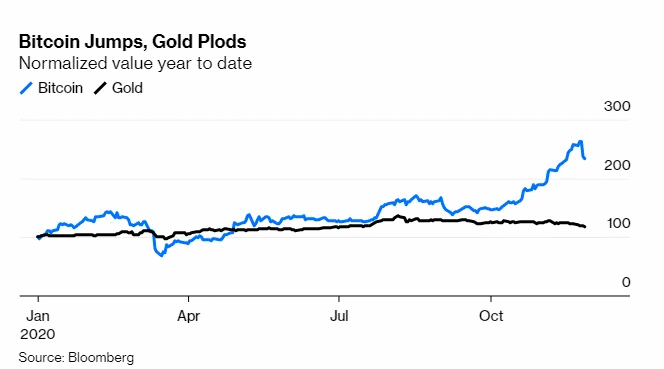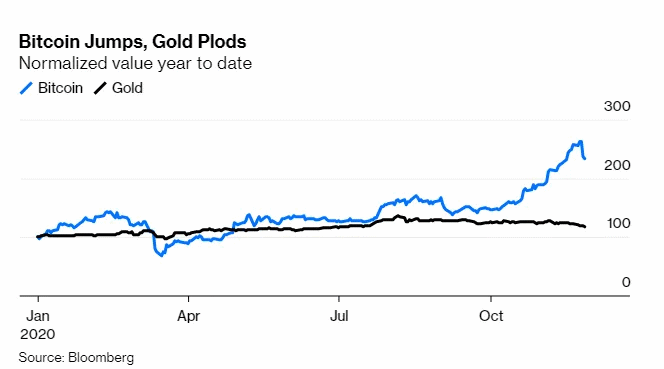Stories about vaccines getting approval have been making the news and everyone is eager to leave this year behind them. No one was prepared for COVID-19. The coronavirus crisis shook the world and forced us to rethink many things. Even before the coronavirus struck, a financial revolution was already underway with cash being the main casualty. A couple things drastically accelerated were the way we move money and make payments. More importantly, the coronavirus made us rethink money and accelerated the pace of bitcoin’s adoption. Will the the post-pandemic world look like what we knew, or will it be something very different? Actually, COVID-19 put the last nail to the coffin of our already debt-ridden economy. Financial historian and senior fellow with the Hoover Institution at Stanford University, Niall Ferguson says bitcoin is winning the Covid-19 monetary revolution. In an article on Bloomberg last week, he wrote: “Bitcoin Is Winning the Covid-19 Monetary Revolution“. In the article, Ferguson said that bitcoin’s sovereignty and built-in scarcity in a virtual world characterized by boundless abundance are driving its adoption. He suggested that the next US administration under Joe Biden, should not form a “blockchain dollar” like China, but instead, it should understand the advantages of integrating Bitcoin into the US financial system. We are going through a great crisis, and a significant turning point in our history. Some predict the pandemic will bring about a new world order led by China. Others hope it will usher in a new age of global cooperation and a new monetary revolution.
Ilias Louis Hatzis is the founder and CEO at Kryptonio, a “keyless” non-custodial bitcoin and cryptocurrency wallet, that lets users manage bitcoin and crypto, without private keys or passwords.
In 2004, Niall Ferguson was named as one of TIME magazine’s 100 most influential people in the world. He’s won numerous awards and reached a global audience with his works on the history of money and the economy. Ferguson, has taught at Cambridge, Oxford, and Harvard, published in 2008 the book “The Ascent of Money: A Financial History of the World”. This was later adapted for television as a five-part documentary (YouTube that won the 2009 International Emmy award for Best Documentary. Up until a few years ago, Ferguson thought bitcoin was doomed to fail, as he believed is was impossible for money to exist without the backing of a state.
Since, he’s taken a different stance on the matter.
In his article he argued that just like other pandemics before it, COVID-19 accelerated the current monetary revolution, making a connection with what happened during the Black Death pandemic:
“First, we should not be surprised that a pandemic has quickened the pace of monetary evolution. In the wake of the Black Death, as the historian Mark Bailey noted in his masterful 2019 Oxford Ford lectures, there was an increased monetization of the English economy. Prior to the ravages of bubonic plague, the feudal system had bound peasants to the land and required them to pay rent in kind, handing over a share of all produce to their lord. With chronic labor shortages came a shift toward fixed, yearly tenant rents paid in cash. In Italy, too, the economy after the 1340s became more monetized: It was no accident that the most powerful Italian family of the 15th and 16th centuries were the Medici, who made their fortune as Florentine moneychangers.
In a similar way, Covid-19 has been good for Bitcoin and for cryptocurrency generally. First, the pandemic accelerated our advance into a more digital word: What might have taken 10 years has been achieved in 10 months. People who had never before risked an online transaction were forced to try, for the simple reason that banks were closed. Second, and as a result, the pandemic significantly increased our exposure to financial surveillance as well as financial fraud. Both these trends have been good for Bitcoin.”
The economic ramifications of the coronavirus have triggered a surge of interest in scarce digital assets like bitcoin. Governments and central banks are doing whatever it takes to soften the blow from the pandemic, which is why they are printing massive amounts of money. Its only natural that more people are looking for financial safe-havens. While gold is still king, bitcoin could take the reins and dethrone gold, as the world becomes increasingly digitized.
Ilias Louis Hatzis is the founder and CEO at Kryptonio, a “keyless” non-custodial bitcoin and cryptocurrency wallet, that lets users manage bitcoin and crypto, without private keys or passwords.
In 2004, Niall Ferguson was named as one of TIME magazine’s 100 most influential people in the world. He’s won numerous awards and reached a global audience with his works on the history of money and the economy. Ferguson, has taught at Cambridge, Oxford, and Harvard, published in 2008 the book “The Ascent of Money: A Financial History of the World”. This was later adapted for television as a five-part documentary (YouTube that won the 2009 International Emmy award for Best Documentary. Up until a few years ago, Ferguson thought bitcoin was doomed to fail, as he believed is was impossible for money to exist without the backing of a state.
Since, he’s taken a different stance on the matter.
In his article he argued that just like other pandemics before it, COVID-19 accelerated the current monetary revolution, making a connection with what happened during the Black Death pandemic:
“First, we should not be surprised that a pandemic has quickened the pace of monetary evolution. In the wake of the Black Death, as the historian Mark Bailey noted in his masterful 2019 Oxford Ford lectures, there was an increased monetization of the English economy. Prior to the ravages of bubonic plague, the feudal system had bound peasants to the land and required them to pay rent in kind, handing over a share of all produce to their lord. With chronic labor shortages came a shift toward fixed, yearly tenant rents paid in cash. In Italy, too, the economy after the 1340s became more monetized: It was no accident that the most powerful Italian family of the 15th and 16th centuries were the Medici, who made their fortune as Florentine moneychangers.
In a similar way, Covid-19 has been good for Bitcoin and for cryptocurrency generally. First, the pandemic accelerated our advance into a more digital word: What might have taken 10 years has been achieved in 10 months. People who had never before risked an online transaction were forced to try, for the simple reason that banks were closed. Second, and as a result, the pandemic significantly increased our exposure to financial surveillance as well as financial fraud. Both these trends have been good for Bitcoin.”
The economic ramifications of the coronavirus have triggered a surge of interest in scarce digital assets like bitcoin. Governments and central banks are doing whatever it takes to soften the blow from the pandemic, which is why they are printing massive amounts of money. Its only natural that more people are looking for financial safe-havens. While gold is still king, bitcoin could take the reins and dethrone gold, as the world becomes increasingly digitized.

Also, as interest rates are cut to zero, earning interest on fiat deposits is nearly impossible. DeFi platforms offer significantly greater interest rates (6% annual savings rates or more) on cryptocurrency deposits, compared to what is available with traditional bank deposits. That’s why we’re seeing the world surge to decentralized interest-earning platforms, and $14.64 billion being locked on DeFi.
Crises always test the limits of existing systems and point out the need for new ones. This was true during the financial crisis of 2008, when bitcoin was born, and it’s even more true today. Almost every month, some major organization is making an announcement about buying bitcoin. A few days ago, MicroStrategy announced that they bought another $50 million worth of bitcoin. A few years ago, no one would have imagined a country’s pension fund being exposed to Bitcoin. Yet today this is a reality in Norway where the government’s ownership stake in MicroStrategy means Norwegian pension owners are indirectly invested in Bitcoin. This is a huge step forward that will have long-lasting effects for the entire digital asset industry.
The world is showing signs of distrust towards the current financial system. Trust in the dollar, euro, pound and other government currencies has been severely weakened and is unlikely to be restored anytime soon. The total value of fiat currency in the world is $250 trillion which is being devalued rapidly because governments are printing money. If Bitcoin ends up becoming the trusted financial mechanism for solving that devaluation problem it could be worth trillions and each bitcoin could be worth millions.
The pandemic has accelerated the acceptance of Bitcoin.
Bitcoin’s continued growth is getting stronger every day and the idea of central banks viewing Bitcoin as a complement to their gold holdings, doesn’t feel that far-fetched anymore. This year we’ve seen the greatest monetary experiment in the modern era, and bitcoin has managed to pin our fiat system on the ropes. Bitcoin’s borderless and permissionless nature is a great substitute to fiat money, and its going to be in even greater demand in the post-coronavirus world.
Crises always test the limits of existing systems and point out the need for new ones. This was true during the financial crisis of 2008, when bitcoin was born, and it’s even more true today. Almost every month, some major organization is making an announcement about buying bitcoin. A few days ago, MicroStrategy announced that they bought another $50 million worth of bitcoin. A few years ago, no one would have imagined a country’s pension fund being exposed to Bitcoin. Yet today this is a reality in Norway where the government’s ownership stake in MicroStrategy means Norwegian pension owners are indirectly invested in Bitcoin. This is a huge step forward that will have long-lasting effects for the entire digital asset industry.
The world is showing signs of distrust towards the current financial system. Trust in the dollar, euro, pound and other government currencies has been severely weakened and is unlikely to be restored anytime soon. The total value of fiat currency in the world is $250 trillion which is being devalued rapidly because governments are printing money. If Bitcoin ends up becoming the trusted financial mechanism for solving that devaluation problem it could be worth trillions and each bitcoin could be worth millions.
The pandemic has accelerated the acceptance of Bitcoin.
Bitcoin’s continued growth is getting stronger every day and the idea of central banks viewing Bitcoin as a complement to their gold holdings, doesn’t feel that far-fetched anymore. This year we’ve seen the greatest monetary experiment in the modern era, and bitcoin has managed to pin our fiat system on the ropes. Bitcoin’s borderless and permissionless nature is a great substitute to fiat money, and its going to be in even greater demand in the post-coronavirus world.

Ilias Louis Hatzis
Ilias Louis Hatzis is the Founder & CEO at Mercato Blockchain Corporation AG.
He writes the Blockchain Weekly Front Page each Monday.I have no positions or commercial relationships with the companies or people mentioned. I am not receiving compensation for this post.
Subscribe by email to join the 25,000 other Fintech leaders who read our research daily to stay ahead of the curve.
I have no positions or commercial relationships with the companies or people mentioned. I am not receiving compensation for this post.
http://dailyfintech.com
He writes the Blockchain Weekly Front Page each Monday.I have no positions or commercial relationships with the companies or people mentioned. I am not receiving compensation for this post.
Subscribe by email to join the 25,000 other Fintech leaders who read our research daily to stay ahead of the curve.
I have no positions or commercial relationships with the companies or people mentioned. I am not receiving compensation for this post.
http://dailyfintech.com
No Offer, Solicitation, Investment Advice, or Recommendations
This website is for informational purposes only and does not constitute an offer to sell, a solicitation to buy, or a recommendation for any security, nor does it constitute an offer to provide investment advisory or other services by FINYEAR.
No reference to any specific security constitutes a recommendation to buy, sell or hold that security or any other security.
Nothing on this website shall be considered a solicitation or offer to buy or sell any security, future, option or other financial instrument or to offer or provide any investment advice or service to any person in any jurisdiction.
Nothing contained on the website constitutes investment advice or offers any opinion with respect to the suitability of any security, and the views expressed on this website should not be taken as advice to buy, sell or hold any security. In preparing the information contained in this website, we have not taken into account the investment needs, objectives and financial circumstances of any particular investor.
This information has no regard to the specific investment objectives, financial situation and particular needs of any specific recipient of this information and investments discussed may not be suitable for all investors.
Any views expressed on this website by us were prepared based upon the information available to us at the time such views were written. Changed or additional information could cause such views to change.
All information is subject to possible correction. Information may quickly become unreliable for various reasons, including changes in market conditions or economic circumstances.
No reference to any specific security constitutes a recommendation to buy, sell or hold that security or any other security.
Nothing on this website shall be considered a solicitation or offer to buy or sell any security, future, option or other financial instrument or to offer or provide any investment advice or service to any person in any jurisdiction.
Nothing contained on the website constitutes investment advice or offers any opinion with respect to the suitability of any security, and the views expressed on this website should not be taken as advice to buy, sell or hold any security. In preparing the information contained in this website, we have not taken into account the investment needs, objectives and financial circumstances of any particular investor.
This information has no regard to the specific investment objectives, financial situation and particular needs of any specific recipient of this information and investments discussed may not be suitable for all investors.
Any views expressed on this website by us were prepared based upon the information available to us at the time such views were written. Changed or additional information could cause such views to change.
All information is subject to possible correction. Information may quickly become unreliable for various reasons, including changes in market conditions or economic circumstances.
Laurent Leloup : Conseil, accompagnement, financement fintech, blocktech
Finyear : Future Finance, Fintech, DeFi | Daily News
Chaineum : Plateforme STO, financements alternatifs
HealthTech.Finance : Conseil, accompagnement, financement Healthtech
Gryn.Tech : Decarbonation Solutions
Tickando : Financement participatif sur blockchain
MyLastWill: The Willtech Company
Finyear : Future Finance, Fintech, DeFi | Daily News
Chaineum : Plateforme STO, financements alternatifs
HealthTech.Finance : Conseil, accompagnement, financement Healthtech
Gryn.Tech : Decarbonation Solutions
Tickando : Financement participatif sur blockchain
MyLastWill: The Willtech Company
Autres articles
-
Tether investit dans StablR pour promouvoir l'adoption du stablecoin en Europe
-
Chainalysis acquiert Hexagate, fournisseur de solutions de sécurité WEB3
-
Nomination | Esker annonce la nomination de Dan Reeve en tant que membre du Comité Exécutif
-
Un montant de 1,8 million de dollars levé - La nouvelle ICO de Dogizen étonne les experts avec une approche inédite au monde
-
Shares Pro étoffe (déjà ?) son offre avec l'acquisition du PER compte-titres du groupe Inter Invest








